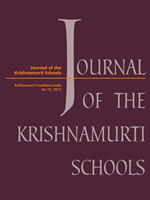Issue 19 - January 2015
- Written by J. Krishanmurti
To continue with what we were saying in our previous letter, we were pointing out your responsibility to study, to learn and to act.
- Written by O.R. Rao
‘So, our problem is not so much the child, the boy or the girl, but the teacher, the educator, who needs educating much more than the pupil. And to educate the educator is far more difficult than to educate the child, because the educator is already set, fixed. He merely functions in a routine, because he is really not concerned with the thought process, with the cultivation of intelligence.’— Krishnamurti.
- Written by Siddhartha Menon
The farmer-speaker in Robert Frost’s poem Mending Wall takes a wry look at his neighbour’s self-satisfied retreat behind his father’s saying: ‘Good fences make good neighbors’.
- Written by Arvind Ranganathan
In my first year as a teacher, I was fortunate to chance upon Kamala Mukunda’s book What did You Ask at School Today?
- Written by T M Krishna
Every narrative on society categorizes people. It even segments thoughts and actions. It sees life as a set of predefined options.
- Written by Devdas Menon
Are we preparing our youth to take to the heroic wise path of the dhirah, the fulfilling path of sreyah? The evidence, unfortunately, points heavily to the contrary.
- Written by S Jayaram
A high altitude trek in the Himalayas has become a part of the learning programme at The Valley School, Bangalore, since the year 2000.
- Written by V Arun and S Purnima
In 2008, a small group of us decided to start a school with a different vision.
- Written by Andrew Alexander
From the snow-capped mountains I walk across the brown-green fells of the Lake District, up past the noisy waterfall to the placid tarn—a place of mirrors and reflections.
- Written by J Shashidhar
Mystics throughout the ages have told us that the self is an illusion and that it is in ‘ending the self’ that true freedom lies.
- Written by N Vaishnavi
I am often struck by the openness and earnestness with which these questions are raised by middle-school children, all of 10-12 years, in a class.
- Written by Kavitha Krishna and Deepak Ramachandran
Every week, science teachers at Rishi Valley School get together for a faculty meeting. We are a diverse group.
- Written by Geetha Waters
Self-inquiry is a process that delves into all areas of concern and conflict in life.
- Written by Kartik Kalyanram
Transitions are a way of life: some expected, some planned, some unplanned and some forced by circumstances.
- Written by G Gautama
Once upon a time, a long time ago, there were teachers who were actively sought out by students and their parents.
- Written by Marina Basu
It was the year of major changes in the academic programme of our junior school’s mixed age group classes.
- Written by Usha Mukunda
As children journey through reading, there are markers along the way which can inform the librarian-educator about their understanding, deepening engagement and discernment of the written and the spoken word.
- Written by Tanuj Shah
Last year on a ‘sabbatical’ from Rishi Valley School I had the opportunity to work with a variety of educational projects, three of these in association with ‘Shishukunj’, an organization I have known since my childhood.
- Written by Viju Jaithirtha
Shibumi, in Bangalore, is a small alternative centre started by a group which includes a trustee of the KFI and teachers who have worked and studied in various Krishnamurti schools in India.
- Written by Manju Mahima Bhatnagar and Rima Anand
Hindi Ki Duniya, by Chandrika Mathur, is a set of five textbooks for classes 1 to 5, accompanied by a workbook as well as an audio CD for each class level.


